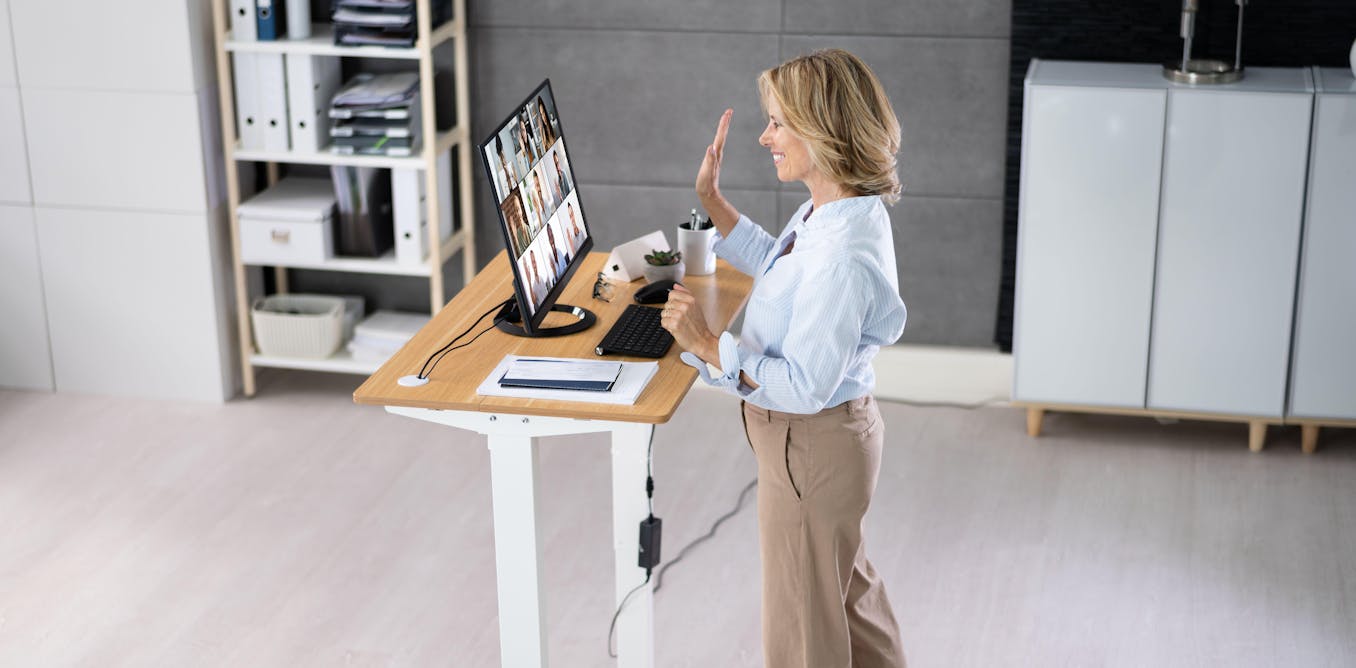" Email X (Twitter) Facebook LinkedIn
The global market for standing desks is booming, projected to reach US$12.6 billion by 2032 (£9.7 billion). These desks have been hailed as a simple fix for the health risks associated with sitting all day. However, recent research suggests that standing might not be the health booster many hoped for.
A new study from Australia involving over 83,000 participants found that prolonged standing may not improve heart health and could even increase the risk of certain circulatory problems.
Researchers discovered that standing for extended periods did not reduce the risk of heart disease and stroke. In fact, spending too much time either sitting or standing was linked to a higher risk of problems such as varicose veins and feeling dizzy or lightheaded when you stand up.
The phrase “sitting is the new smoking” has become popular in the past decade, highlighting the dangers of a sedentary lifestyle. Prolonged sitting has been associated with obesity, diabetes and cardiovascular diseases. In response, standing desks emerged as a trendy solution, offering a way to reduce sitting time without drastically changing daily routines.
But was there solid evidence to support the benefits of standing desks?
Much of the enthusiasm was based on limited studies that didn’t comprehensively assess long-term health consequences. This gap in knowledge prompted researchers to investigate further.
In the new study, participants wore devices to track their sitting, standing and physical activity over several years. This objective measurement provided accurate data, reducing the inaccuracies often found in self-reported information. The researchers found that sitting for more than ten hours a day was associated with a higher risk of heart disease and stroke.
However, simply standing more didn’t mitigate this risk. In fact, standing for extended periods was linked to an increased risk of circulatory problems.
Prolonged standing can cause blood to pool in the legs, leading to conditions such as varicose veins.
The study’s large sample size and use of objective data strengthen the reliability of these findings. However, as an observational study, it cannot definitively establish cause and effect. Also, the average age of participants was around 61 years, which may limit how these results apply to younger people. A man’s lower legs covered in varicose veins. Standing for long periods can increase the risk of varicose veins. sutulastock/Shutterstock Movement is key
These findings suggest that simply swapping sitting for standing isn’t a perfect solution. Our bodies respond better to regular movement rather than static positions, whether that’s sitting or standing.
Incorporating short walks, stretching or light exercises throughout the day can interrupt long periods of inactivity and offer significant health benefits.
Workplace interventions promoting movement have shown promise. Researchers found that office workers who reduced their sitting time by adding periods of standing and light activity saw improvements in blood sugar levels and other health markers.
Another study indicated that alternating between sitting and standing, combined with brief walks, was more effective for health than standing alone.
Sit-stand desks, designed to facilitate easy position changes, offer a promising solution. They promote frequent posture changes and can alleviate discomfort associated with prolonged static positions. Some models even feature reminders to encourage regular movement, integrating activity into the workday."
Thing is that I move more while standing. I will do random hip, shoulder, kneck rolls. lift my legs and arms sometimes. Im not wild about pushing sit/stand desks. Better to keep it at stand height and have a barstool height chair that you don’t get to comfortable in so that you do change between sitting and standing. Guessing treadmill desks are going to become all the rage soon.
The headline is doing such a disservice to the actual study, because the study itself is a good thing. 86 000 participants auto-tracked instead of self-reporting (as we’ve seen in other similar studies) over several years demonstrating that standing for long periods of time is not better than sitting for the same amount.
It might seem obvious to some people, but “common sense” isn’t always the same as actual science. This is the type of research and evidence we need to make informed health choices.
Could it be that being forced to be in the same place and do the same thing for 8 hours a day is bad for you regardless of what that thing is and how you do it?
Unbelievably misleading title on this article
Workplace interventions promoting movement have shown promise. Researchers found that office workers who reduced their sitting time by adding periods of standing and light activity saw improvements in blood sugar levels and other health markers.
Simple actions such as taking the stairs, walking to a colleague instead of emailing, or standing during phone calls can all contribute. Setting a timer to remind you to move every 30 minutes can help break up long periods of sitting or standing, empowering you to take control of your health.
My phone/fitness tracker reminds me to get up and move regularly and I’ve found that to be super helpful.
Yes.
You’re not supposed to stand all day. You’re supposed to alternate. Sitting down all day isn’t good for your health either.
I end up alternating between standing and sitting as the day continues, which is more helpful for me personally
Which is what EVERYONE does with them.
This article is wildly misleading.
Standing for 8 hours is bad Standing desks aren’t.





